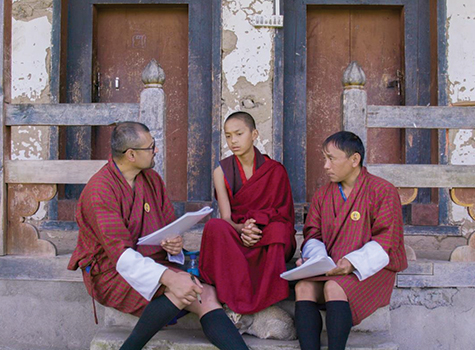By Jennifer Allen
“…books that take place in the future… many of them are black or white: it’s either a utopia or misery. The real truth is that there’s going to be both things in any future….” ~ Albert Brooks
December 8. Just one day out of so many in our calendar that seems so small in retrospect, yet it was on this day in 1980 when one of the most influential men in not only music but also in world at large lost his life to brutal violence. Some people say he was a visionary, but John Lennon certainly had his share of flaws.
Some in more recent years have compared him to a more modern Mahatma Gandhi. However, when you compare the men side by side, they are actually very different, even if they shared a similar overall goal of peace and equality.
John Winston Lennon was certainly a force to be reckoned with when it came to his music. After hearing early American rock n’ roll from the likes of Buddy Holly and Elvis Presley as a teenager, he showed incredible talent with instruments like harmonica, guitar and later piano.
He and Paul McCartney were the songwriters for a majority of the Beatles music, which is rather ironic since neither could read or write music.
It’s also very obvious when in the summer of 1967, the Beatles’ music drastically changed, along with John’s general perspective on life and the world around him. Suddenly their longtime manager Brian Epstein was gone and the group needed some sort of focus. They visited the Maharishi Mahesh Yogi and soon after that John became increasingly interested in a certain aloof Japanese artist.
Before this life change, John was the stereotypical “bad boy” of the Beatles. As most rock musicians are wont to do when they rise to fame, he participated in a wide variety of debauchery. He was a chronic drinker, smoker and drug user most of his life. More often than not, the substances made him more physically and vocally abusive. His now (in)famous “…we’re more popular than Jesus now” comment about how big the Beatles had become was made after one of his first LSD experiences.
Honestly I think that the edginess and anger that John possessed is part of what made the Beatles so great. His headstrong attitude contributed to a lot of what made their music (and later his collaborations with Yoko Ono) so different than anyone else at the time. Suddenly after 1967 he decided to start breaking even more rules and ultimately become an ambassador for anti-war, anti-establishment, and anti-discrimination causes.
Ironically, when John Lennon went into his period of musical experimentation (which eventually was a factor in the Beatles break up) he and Yoko Ono created the satirical Bagism movement… which is to say that by wearing or living in a bag, then a person could not be judged by any other attributes other than the person’s words and/or message. While it was a protest in a more tongue-in-cheek sort of way, they did have a point.
It makes it all more heartbreaking that he was in the process of overcoming many of the demons of his past when on the night of December 8 Mark David Chapman waited so patiently in front of the Dakota (John Lennon’s residence in NYC) with his copy of The Catcher of the Rye in one hand and a .38 revolver in the other. Five shots rang out… 4 of which struck Lennon in the back. Chapman later confirmed that his reasoning for the act was partially due to Lennon’s aforementioned “…more popular than Jesus” comment and other perceptions that he was anti-Christian along with a general anger at John singing about a world with no greed or possessions yet there he is sitting in a white room of an expensive house playing a baby grand piano.
Mohandas Karamchand Gandhi’s origins appear to be the complete opposite of Lennon’s. His deeply pious mother’s beliefs would ingrain into his personality for most of his life. He was not known as a miraculous genius in his youth, but instead was a fairly average student with barely passing grades on many of his entrance exams. He was for all intents and purposes the most average person you could think of.
Gandhi’s views began to shift in 1893 when he went to live in South Africa. In Gandhi’s case he witnessed the oppression firsthand. He thought that being “Indian” meant more than religion or caste, and went through various (yet peaceful) lengths to prove it. He was, though, seen as racist against certain groups such as African blacks and the Dalits, which even today has caused some controversy.
Despite Gandhi’s own lifestyle and overall goals for India and Indians, there were no less than 5 attempts on his life. The final attempt on January 30, 1948 was by far the most personal as he was shot directly in the chest 3 times by Nathuram Godse (and by proxy Godse’s conspirators). The irony of a man who was killed by the one concept he was trying so hard to diminish is what makes the act so difficult to endure.
Still… the core personalities of both men did extend into their work. Gandhi established the Non-Cooperation Movement as a way to protest British rule through more non-violent means. Lennon (and Ono’s) work was a bit more in-your-face with their music, artwork, and various rights protests.
Was either method truly the right one? Well many would argue that while the concepts offered in Lennon’s music or in Gandhi’s writings are idealistic, the idealism of a pure Utopia is simply not possible. Even Gene Roddenberry’s original Utopian concepts shown in Star Trek have since been torn down by subsequent Trek series. It is deeply seated within human nature to be passionate, and yet many systems of belief tell us to retrain those desires.
Perhaps instead we should combine both philosophies and create a true sense of temperance. Maybe it could work, and maybe it couldn’t… but you can’t deny that both men’s approaches to create a better world do have their merits. Now if only we can reach a common ground between the two… then I believe we may be closer to creating that utopia than was ever possible before.



